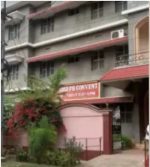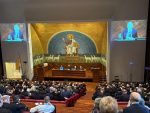Aftab Bahadur was executed in the early hours of June 10 in the Central Jail in Lahore, Pakistan. He had been on death row for over 22 years
Bahadur was sentenced to die for a crime on September 5, 1992, where a woman – Sabiha Bari – and her two sons were murdered.
Ghulam Mustafa, a plumber with whom Aftab worked as an apprentice, was arrested a day after the crime. He allegedly implicated Bahadur under torture. Mustafa recanted his statement and said Bahadur had nothing to do with the crime.
The only “eyewitness” to the crime who testified against Bahadur made a statement before a religious minister that he was coerced into his testimony, that he was not even there, and that he certainly did not see Bahadur commit the crime. Bahadur had insisted he was innocent. According to him, police had asked for a 50,000 rupee bribe when he was arrested and said they would let him go if he paid. As a plumber’s apprentice, Bahadur said he could not pay.
Bahadur was convicted under the Speedy Trials Act in April 1993. Special trials under the Act were intended for terrorists, but they have been abused in a number of high-profile cases.
This is an essay Bahadur wrote from his prison cell, translated from the Urdu by Reprieve, who helped provide him with pro bono legal assistance.
I just received my Black Warrant. It says I will be hanged by the neck until dead on Wednesday, 10 June. I am innocent, but I do not know whether that will make any difference. During last 22 years of my imprisonment, I have received death warrants many times. It is strange, but I cannot even tell you how many times I have been told that I am about to die. Obviously it feels bad whenever the warrants are issued. I start to count down the days, which is in itself painful, and I find that my nerves are shackled in the same way as my body. In truth, I die many times before my death. I suppose my life experience is different from that of most people, but I doubt there is anything more dreadful than being told that you are going to die, and then sitting in a prison cell just waiting for that moment. For many years – since I was just 15 years old – I have been stranded between life and death. It has been a complete limbo, total uncertainty about the future.
I am a Christian, and sometimes that is difficult here. Unfortunately, there is one prisoner in particular who has tried to make our lives more difficult. I don’t know why he does it. I got very upset over the Christian bombings that took place in Peshawar. This hurt me deeply, and I wish that Pakistani people could possess a sense of nationality that overrode their sectarianism. There is a small group of us here who are Christians, just four or five, and we are now all in one cell, which has improved my life.
I do everything I can to escape my misery. I am an art lover. I was an artist – just an ordinary one – from my early days, when I was first conscious of anything. Even back then, I was inclined towards painting, as well as writing verses. Although I had no training, it was just a gift of God. But after I was brought to jail I had no other way to express my feelings, as I was then in a state of complete alienation and loneliness. I began some time ago to paint all the signs for the Kot Lakhpat jail, where I am held. Then I was asked to do signs for other jails. Nothing in this world can give me more happiness than the feeling when I paint some idea, or feeling on the canvas. It is my life, so I am happy to do it. My workload is great, and I am exhausted at the end of each day, but I am glad of that, as it keeps my mind off other things.
I have no family to visit me, so when someone does come, it is a wonderful experience. It allows me to reap ideas from the outside world that I can then lay down on my canvas. Being asked about how I was tortured by the police brought back terrible memories that I turned into pictures, though it would perhaps have been better not to have to think of what the police did to try to get me to confess falsely to this crime.
When we heard the news about lifting the death penalty moratorium in December 2014, fear prevailed throughout the cells of the prison here. There was an overriding sense of horror. The atmosphere hung, gloomy, over us all. But then the executions actually started at Kot Lakhpat jail, and everyone started to go through mental torture. Those who were being hanged had been our companions for many years on this road to death, and it is only natural that their deaths left us in a state of despair.
While the death penalty moratorium was ended on the pretext of killing terrorists, most of the people here in Kot Lakhpat are charged with regular crimes. Quite how killing them is going to stop the sectarian violence in this country, I cannot say. I hope I do not die on Wednesday, but I have no source of money, so I can only rely on God and on my volunteer lawyers. I have not given up hope, though the night is very dark.









